History
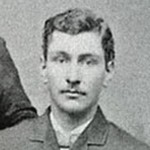 Not every life is of a common type. Once in a while, circumstances come about that create a living situation or way of life that is very different, and for most of us, one that seems exotic in many ways. Such is the case my Great Great Uncle William Jonathan Davis, who married my Great Great Aunt Theresa Elizabeth Spencer on September 29, 1883 in Webster City, Iowa. Their married life was of the much more normal type. They lived several places, finally settling on a ranch near Rushville, Nebraska, where they raised their nine children. That kind of life seems very normal, and it was, but William’s childhood was far from what most of us would consider normal.
Not every life is of a common type. Once in a while, circumstances come about that create a living situation or way of life that is very different, and for most of us, one that seems exotic in many ways. Such is the case my Great Great Uncle William Jonathan Davis, who married my Great Great Aunt Theresa Elizabeth Spencer on September 29, 1883 in Webster City, Iowa. Their married life was of the much more normal type. They lived several places, finally settling on a ranch near Rushville, Nebraska, where they raised their nine children. That kind of life seems very normal, and it was, but William’s childhood was far from what most of us would consider normal.
William Jonathan Davis was born on June 5, 1856 in Llanduno, Wales. His mother Catherine Aldrich Davis died when he was two weeks old. I’m sure that over the years he felt a bit of sadness over the loss of the mother he never knew, but not as much as his older brother Charles Henry, who was a year or so older than William.
When William was seven years old, his father William Jonathan Davis Sr also passed away, leaving the two boys orphaned. Thankfully they had an uncle, Walter Davis who owned a fleet of merchant ships. He took the two boys with him on a freighter and their home was the high seas for the next eleven years. Now to a couple of little boys, I’m sure the high seas felt like quite an adventure, and life on a ship probably kept their imaginations working overtime, thus alleviating at least some of the sadness over their father’s death, by keeping them very busy. My guess is that over time, they became some of the best deck hands their Uncle Walter ever had, and they loved him dearly…so much so, in fact that William named his first son, Walter, after the uncle who saved their lives, and gave them hope for the future again.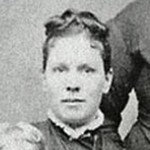
In 1874, his uncle’s ship was delivering cargo to New York City, and Charles and William decided that it was time for them to go out on their own. After saying good bye to their uncle, the boys stayed in New York City, and then in 1875 moved to Chicago, Illinois. William got a job with the North-Western Railway Company, and was later transferred to Kamrar, Iowa as the Section Boss. It was there that he would meet the love of his life, my Great Great Aunt Theresa, or Tessie as she was lovingly nicknamed. The rest, as they say is history, as they lived happily ever after. Quite a change of lifestyle for a boy raised on the high seas.
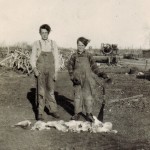 As young men, my dad and his brother, my Uncle Bill loved to do all the normal guy thins that most young men want to do, and hunting was right up there near the top, along with fishing, and pretty much anything that had to do with guns or dynamite, such as blowing a tree stump out of the ground, or sinking the front gate, and then fixing it before their mom found out. They were rough and rugged boys who, like most young men of those times, were growing up too fast. Times were hard, and families needed all the help they could get from all their children. Hunting was something families could do to supply food for their tables, and rabbits were always in abundance…then and now. Of course, for my dad and uncle, the guns were a cool as the hunting. They both loved guns and knew how to use them from the time they were little. Uncle Bill was hunting this particular day with a Mossberg, and my dad was using a 1906 Winchester.
As young men, my dad and his brother, my Uncle Bill loved to do all the normal guy thins that most young men want to do, and hunting was right up there near the top, along with fishing, and pretty much anything that had to do with guns or dynamite, such as blowing a tree stump out of the ground, or sinking the front gate, and then fixing it before their mom found out. They were rough and rugged boys who, like most young men of those times, were growing up too fast. Times were hard, and families needed all the help they could get from all their children. Hunting was something families could do to supply food for their tables, and rabbits were always in abundance…then and now. Of course, for my dad and uncle, the guns were a cool as the hunting. They both loved guns and knew how to use them from the time they were little. Uncle Bill was hunting this particular day with a Mossberg, and my dad was using a 1906 Winchester.
Like most boys, they had high hopes for their hunts. They were going to bag that big buck, or the most rabbits, or even bring in the most fish. I’m sure they competed against each other, 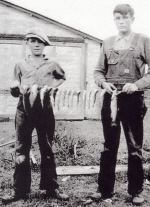 but I think that quite often, they pooled their resources and tried to beat the record they set the last time they went. Of course, nothing went to waste either, because that was not how things were done. The kills they made provided food for their family during those hard times of the great depression.
but I think that quite often, they pooled their resources and tried to beat the record they set the last time they went. Of course, nothing went to waste either, because that was not how things were done. The kills they made provided food for their family during those hard times of the great depression.
Though times were tough, I don’t really think my dad or his brother noticed it much, nor did their sisters really. Sure, they knew times were tough, and that everyone had to help out, but it was simply a way of life, and nothing they thought was so special. I guess that is pretty common with most people who aspire to do great things, whether it be heroic acts, service to country, or stepping up for family. Heroes come in all kinds of forms, and I’m sure that my dad’s family thought of their kids as heroes for all the help they gave them through the years.
 I don’t know how much of the Spencer genes, my cousins Gene, his son Tim, and even his grandson Daniel think that they have, but it’s possible that it’s more than they realize. Gene was a master carpenter, building beautiful furniture that anyone would be proud to own. In fact when I looked at pictures of the furniture Gene made, I wondered if he missed his true calling in life. Oh don’t get me wrong, because he was very successful, but that furniture…well, STUNNING doesn’t say enough!! Gene’s work was beautiful, and he passed that talent down to his son. Tim recently built a desk that is also quite beautiful, and shows that he has his dad’s talent. Daniel, while still a very young man, shows signs if that same talent for building things too.
I don’t know how much of the Spencer genes, my cousins Gene, his son Tim, and even his grandson Daniel think that they have, but it’s possible that it’s more than they realize. Gene was a master carpenter, building beautiful furniture that anyone would be proud to own. In fact when I looked at pictures of the furniture Gene made, I wondered if he missed his true calling in life. Oh don’t get me wrong, because he was very successful, but that furniture…well, STUNNING doesn’t say enough!! Gene’s work was beautiful, and he passed that talent down to his son. Tim recently built a desk that is also quite beautiful, and shows that he has his dad’s talent. Daniel, while still a very young man, shows signs if that same talent for building things too.
Their talent is definitely amazing, but where did that talent come from. Well, I don’t know about the Fredrick side if their family, but our grandpa, Allen Luther Spencer had talent in that 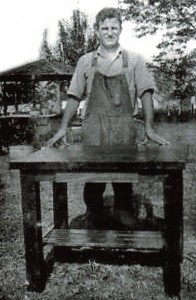 area too. I have never heard anyone talk about his abilities as a carpenter, and usually when we think of carpentry, we think more on the lines of building a house, but the finer side if carpentry is furniture making. I hadn’t really given much thought to the type of work my grandfather did for the railroad, but when I saw the picture of the table Grandpa built, I was reminded of an dependent card my dad had that said the his dad was a carpenter for the railroad.
area too. I have never heard anyone talk about his abilities as a carpenter, and usually when we think of carpentry, we think more on the lines of building a house, but the finer side if carpentry is furniture making. I hadn’t really given much thought to the type of work my grandfather did for the railroad, but when I saw the picture of the table Grandpa built, I was reminded of an dependent card my dad had that said the his dad was a carpenter for the railroad.
Having been a passenger on the 1880 Train in Hill City, South Dakota, I have seen the work of the railroad carpenters. They have transformed those old train cars from junk to a thing of beauty. The carpenters who work on the 1880 Train have done just that. Still, of all these people, I have to say that the ones who have perfected the art of carpentry the most, would be the Fredrick family…and I’m sure you will agree with me on that one.
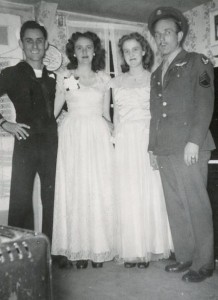 So often, we take many of the people in our lives for granted. We just assume that they will always be there, and never consider the events in their past that…were it not for the grace of God, would have taken their lives, possibly before we even knew them. That is the case with my Uncle George. Were it not for the grace of God, he would have been killed in action in World War II, before he ever had the chance to meet and marry my Aunt Evelyn, becoming father of my cousins, and an uncle to me and the rest of the cousins. Uncle George, like my dad, my Uncle Larry, Uncle Wayne, and many other young men of that era, served his country during World War II. Many people serve in the wars our country has been involved in, and many people are injured and killed every day as a result of their service in our wars. In that way, Uncle George is not an unusual statistic, but what is unusual is that Uncle George survived…a head injury!!! He has had a plate in his head since that injury, but in every other way, he has lead a normal life.
So often, we take many of the people in our lives for granted. We just assume that they will always be there, and never consider the events in their past that…were it not for the grace of God, would have taken their lives, possibly before we even knew them. That is the case with my Uncle George. Were it not for the grace of God, he would have been killed in action in World War II, before he ever had the chance to meet and marry my Aunt Evelyn, becoming father of my cousins, and an uncle to me and the rest of the cousins. Uncle George, like my dad, my Uncle Larry, Uncle Wayne, and many other young men of that era, served his country during World War II. Many people serve in the wars our country has been involved in, and many people are injured and killed every day as a result of their service in our wars. In that way, Uncle George is not an unusual statistic, but what is unusual is that Uncle George survived…a head injury!!! He has had a plate in his head since that injury, but in every other way, he has lead a normal life.
People who don’t know about a situation, which was me concerning my Uncle George…until recently when I came across the Wyoming Wounded List where his name appears, usually assume that the person they know, and have known all their lives, was never wounded. Little did I know how very wrong I was. I knew that Uncle George has been in the Navy in World War II, but that was all I knew about his war history, and I only knew that because of a picture of my Aunt Evelyn, Uncle George, and my parents attending the Military Ball. You see, like most of the men who fought in World War II and probably many other wars too, Uncle 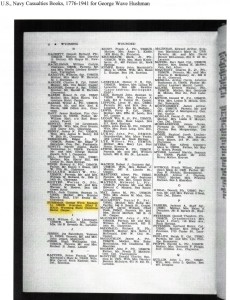 George never spoke of those days. It was like he either wanted to forget, or more likely that he thought he had simply done his duty and it was no big thing, because he came home after all. Many military men feel that way. They think the heroes are the ones who died for their country, but that is not the only way to be a hero. Just going into battle, makes them a hero!!
George never spoke of those days. It was like he either wanted to forget, or more likely that he thought he had simply done his duty and it was no big thing, because he came home after all. Many military men feel that way. They think the heroes are the ones who died for their country, but that is not the only way to be a hero. Just going into battle, makes them a hero!!
After learning about my Uncle George’s injuries from World War II, I feel so much more blessed to have Uncle George in my life. Thinking that, but for the grace of God, he would never have been my uncle, makes that blessing very clear to me, and I thank God for his life and for making him my uncle. I can’t imagine our family without him in it, and I know everyone else agrees with me too. Today is Uncle George’s birthday. Happy birthday Uncle George!! Have a great day!! We love you!!
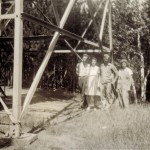 Sometimes we do things for no real reason…we just feel a need somehow. When my dad’s family was living in Holyoke, Minnesota, the family liked to go down to Oak Lake to fish. The lake is located about 15 miles southwest of Holyoke. The lake was a family favorite location. In fact, the whole area was beautiful. The kids, my Aunt Laura, Uncle Bill, my dad, Aunt Ruth, and their friends, went fishing at the lake as often without their parents as they did with them. The lake became an escape from the boredom of everyday life in a small town.
Sometimes we do things for no real reason…we just feel a need somehow. When my dad’s family was living in Holyoke, Minnesota, the family liked to go down to Oak Lake to fish. The lake is located about 15 miles southwest of Holyoke. The lake was a family favorite location. In fact, the whole area was beautiful. The kids, my Aunt Laura, Uncle Bill, my dad, Aunt Ruth, and their friends, went fishing at the lake as often without their parents as they did with them. The lake became an escape from the boredom of everyday life in a small town.
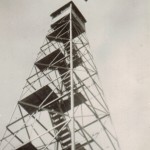
At some point the kids came across the Fire Warden’s house. You see, the area was very wooded, and there was enough fire danger to warrant not only a fire warden, but a fire watch tower in the area. Of course, the summer season in any wooded area presents a high fire danger, as the summer heat dries out the area. Over time, in their hikes through the area, the kids became friends with the fire warden, and were eventually invited to climb up in the fire tower to check out the view from far above the forest floor. It soon became a tradition. When the kids and their friends went fishing at Oak Lake, they also stopped by the 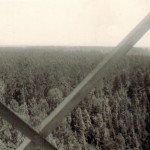 tower, and climbed it every time.
tower, and climbed it every time.
Yes, they loved visiting with the person in the tower, but they also climbed the tower when it was unmanned. I suppose it was partly the challenge of climbing up the high tower. Or it could have been the beauty of the view from the top of the tower. Maybe it was the visit with the watchman in the tower. Somehow, I don’t really think that any of those were the real reason the kids and their friends climbed the tower, every time they went by it. I think they had a very simple reason that they did it…because it was there. And sometimes that is all the reason you need.
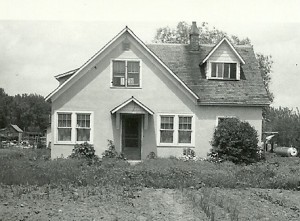 All too often, in this day and age, we don’t think about the modern conveniences that we have. Things like electricity, indoor plumbing, gas (both for cars and houses), cars, television, and telephone are the normal everyday items we count on, but think very little about.
All too often, in this day and age, we don’t think about the modern conveniences that we have. Things like electricity, indoor plumbing, gas (both for cars and houses), cars, television, and telephone are the normal everyday items we count on, but think very little about.
When you consider that not so very many years ago, people had to either get out of bed, practically get dressed, and go outside…even in the bitter cold of winter, to go to the outhouse, you know the outdoor toilet which was a little building out back of the house, or have a pot in the bedroom to use, and then emptied in the morning. Neither choice was perfect, but I suppose the pot in the house would have been better than going outside in the bitter cold of winter. These days we abhor the thought of stopping at a rest stop on a trip and finding out that all it has is an outhouse, because we expect that every place has modern indoor plumbing, whether it is a fact or not.
In times past, people went to bed and got up with the sun, because it was too expensive to light candles or lanterns. The work had to be done by daylight anyway, so they might just as well be up at dawn. of course, most teenagers these days consider anything before noon to be pure torture, and might even whine a little if they have to be up before that hour. Still, there wasn’t really any shift work back then, and families were together in the evening, unless the father was working in another state or town.
Letters were used to communicate, and unfortunately that often meant that if your loved ones didn’t live in the same place you did, you might hear of their passing months after the fact. It took a long time for letters to arrive, especially if they were coming from back east. Today, we can inform people of events that happen in our lives, almost the second they happen. In fact, it’s almost like they are there with you, and if it is an event you know about ahead of time, you can Skype with them, and they can watch it happen. Sometimes, even with all of our modern conveniences, we still think life is really hard, but if we think back to days gone by, we will know that we really have no idea what a hard life is.
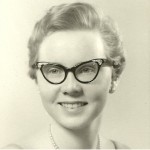 For those of us who have worn glasses, it is easy to look back at those old pictures with those old funky glasses and think to ourselves, “What was I thinking when I picked those out??” It doesn’t matter how old we are now, the glasses we picked out a few years ago, are totally outdated by the time we think to look back on the pictures taken with them on. I know that styles change, and at the time we got the glasses, they were probably very much in style, but years later, we can only laugh at how funny they looked on us.
For those of us who have worn glasses, it is easy to look back at those old pictures with those old funky glasses and think to ourselves, “What was I thinking when I picked those out??” It doesn’t matter how old we are now, the glasses we picked out a few years ago, are totally outdated by the time we think to look back on the pictures taken with them on. I know that styles change, and at the time we got the glasses, they were probably very much in style, but years later, we can only laugh at how funny they looked on us.
When we look back on the really old pictures, like when our parents and grandparents were young, we have the opportunity to have a pretty good laugh at their expense, because those glasses were really old fashioned. Of course, we do need to be a little bit careful, because just remember that our children and grandchildren will someday be looking at our old pictures with those funky glasses, and having a good laugh at our expense. I suppose we just have to be good natured about it, because it is a fact of life that we will all be considered old fashioned at some point in our lives.
When I was a kid in 4th grade, I got my first pair of glasses. While they were not the cat eye type, they were a royal blue color. I thought they were so cool at the time, but imagine how much they clashed with a lot of the clothes I wore. It didn’t matter to me, they were the coolest glasses ever in my 9 year old mind. I think my mom even tried to talk me into something else, but I would have none of it. I wore those glasses much longer than I would have liked, but you can’t just switch back and forth, especially as a little kid.  Buying several pairs of glasses for a kid who might just as easily lose them, simply makes no sense.
Buying several pairs of glasses for a kid who might just as easily lose them, simply makes no sense.
Then, there was my let’s make those glasses as small as you can stage…never mind the fact that they were black, so you weren’t hiding the glasses at all. I really wanted contact lenses by that time, but my eye doctor didn’t think they would work for me. They probably would have, because they did just a few years later, but that was how it went. So there I was wearing another funky pair of glasses for far longer than I wanted to, and more often than not, removing them before any pictures could be taken.
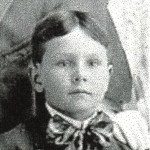 Travel these days is so common that we really don’t give it much thought at all, but travel or moving in days gone by, was a very different matter, or perhaps it is just that some things worry people of different ages more that other people, or shall we say older people. I was reading a story written by my cousin Raymon Dunahee, who is my Grandpa Spencer’s sister, Alice’s son. The story begins, “I slept soundly (I guess we all did) all night and woke up the next morning to find that I was still all there. If anything had carried us off during the night they brought us back before morning.” When I read that, it reminded me of some of the camping trips my family took when we were kids, and my sisters and I kept waking my dad up so he could put another log on the fire to keep the bears away…like that would have made any difference. As I read through the thoughts of a little boy as he embarked of an unknown, and maybe a little scary future, my thoughts turned to how different travel was back then.
Travel these days is so common that we really don’t give it much thought at all, but travel or moving in days gone by, was a very different matter, or perhaps it is just that some things worry people of different ages more that other people, or shall we say older people. I was reading a story written by my cousin Raymon Dunahee, who is my Grandpa Spencer’s sister, Alice’s son. The story begins, “I slept soundly (I guess we all did) all night and woke up the next morning to find that I was still all there. If anything had carried us off during the night they brought us back before morning.” When I read that, it reminded me of some of the camping trips my family took when we were kids, and my sisters and I kept waking my dad up so he could put another log on the fire to keep the bears away…like that would have made any difference. As I read through the thoughts of a little boy as he embarked of an unknown, and maybe a little scary future, my thoughts turned to how different travel was back then.
As I read through the rest of his story, and the continuing mishaps they had, I could see why he felt a little apprehensive about things. The vehicle they were traveling in had a couple of “bum casings” and he was concerned that if the roads got bad at all they might end up stuck in a very desolate place. They were trying to make Kalispell, Montana that day, and they still had a hundred and twenty five miles to go. They were in the mountains when the rear tire blew. The spare was not good either, so they limped along the six miles to the next town and got a new tire. It was another forty miles to Kalispell, but they made it without further mishap and bought another tire there. The trip to Kalispell was a side trip to visit his grandparents before they went on to their final destination…Twin Falls, Idaho. During the visit with his grandparents, they decided to go on to Twin Falls, Idaho with them. The rest of the trip was filled with similar troubles and I’m sure that Raymon wondered if they would make it at all, and if he even wanted to go to this place when it seemed that everything was against their move as it was.
Then, to add to Raymon’s concerns, their trip started to become very slow going…not because of car problems, but because of fish problems. It’s hard to imagine that fish could cause such big problems, but they can for a boy who is really ready to get where they are going. It seems that over the next three days, they family only made twelve miles!! “How could that be?” you ask. Well, they were traveling in an area where there were lots of mountain streams, and every time they came upon another stream, the men wanted to stop and fish!! I don’t think they caught very many fish, but according to Raymon, there were plenty of mosquitoes, and he was really ready to be away from them. I’m sure he was thinking, “Let’s just go!!” And there was no reason to even ask, “Are we there yet?” because you have to be moving for that question to even make sense. In the end, they did make it to Twin Falls, Idaho, where they lived out their days.
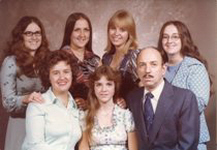 As kids, my sisters and I all had long hair. My dad always loved long hair, and never wanted any of us to cut it. Today, my sister, Cheryl and I are the only ones with hair that is very long. Neither of us can bear to cut it. I don’t know if it is because Dad always liked it, or if we just can’t imagine ourselves in shorter hair. Maybe it is a little of both. I think that people tend to like hair styles that are similar to what they grew up with, but not always, I suppose…after all my three younger sisters no longer have long hair. I suppose all little girls want to be beautiful, and our hair is a big part of that. Whether our hair is long or short, curly or straight, it is like a crowning glory to our look. We hate bad hair days, because we just don’t feel like we look our best. And of course, wind is the worst enemy a great hair style can have. You can’t put enough hairspray in your hair to fight of a windy day and the wind can make long hair stand straight up if you don’t hold it down.
As kids, my sisters and I all had long hair. My dad always loved long hair, and never wanted any of us to cut it. Today, my sister, Cheryl and I are the only ones with hair that is very long. Neither of us can bear to cut it. I don’t know if it is because Dad always liked it, or if we just can’t imagine ourselves in shorter hair. Maybe it is a little of both. I think that people tend to like hair styles that are similar to what they grew up with, but not always, I suppose…after all my three younger sisters no longer have long hair. I suppose all little girls want to be beautiful, and our hair is a big part of that. Whether our hair is long or short, curly or straight, it is like a crowning glory to our look. We hate bad hair days, because we just don’t feel like we look our best. And of course, wind is the worst enemy a great hair style can have. You can’t put enough hairspray in your hair to fight of a windy day and the wind can make long hair stand straight up if you don’t hold it down.
I think my dad may have liked long hair in the beginning, because his sister, Laura always had 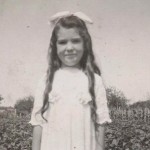 long hair as a child. their mother was so proud of her daughter’s long curls, and she worked very hard on getting them just right for her. That kind of care can make a little boy, who is twelve years younger than his big sister, think that hair is very important…even if he doesn’t realize it. Curls have gone in and out of style, and these days women wear their long hair both ways. Cheryl likes her hair curled, but my hair has a tendency to get frizzy and tangle easily, so I straighten mine. I have natural curl, but it isn’t beautiful, with great curls, but rather an errant wave here and there. Ugh!! But Aunt Laura’s long curls were beautiful, and more in style today than people would expect. They reminded me of a long haired Shirley Temple look. You could tell that Aunt Laura liked her long hair too. She always had pretty bows in it as a child, and in the picture where she was showing off her curls, she seemed very proud of them, and her mom was really proud of it too.
long hair as a child. their mother was so proud of her daughter’s long curls, and she worked very hard on getting them just right for her. That kind of care can make a little boy, who is twelve years younger than his big sister, think that hair is very important…even if he doesn’t realize it. Curls have gone in and out of style, and these days women wear their long hair both ways. Cheryl likes her hair curled, but my hair has a tendency to get frizzy and tangle easily, so I straighten mine. I have natural curl, but it isn’t beautiful, with great curls, but rather an errant wave here and there. Ugh!! But Aunt Laura’s long curls were beautiful, and more in style today than people would expect. They reminded me of a long haired Shirley Temple look. You could tell that Aunt Laura liked her long hair too. She always had pretty bows in it as a child, and in the picture where she was showing off her curls, she seemed very proud of them, and her mom was really proud of it too.
Another funny thing about long hair is how it acts when you flip it out of your way. My grandson, Josh and I were putting up my Christmas tree on Saturday. As I bent over to get another ornament for the tree, my hair got in my way, so I flipped it out of the way. Josh 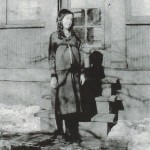 started laughing. I asked what was so funny, and he told me that my hair had landed on the tree, and it was still there. It wasn’t the first time my hair had landed somewhere it didn’t belong. Bob and I were at Mount Rushmore on the 4th of July one year. It was very crowded. I flipped my hair back, and got this…feeling. I turned around to see the woman behind me touching her nose, and saying, “She hit me with her hair!” I was horrified. I immediately apologized, saying that sometimes I didn’t realize how far my hair reached. She was gracious, and the situation passed, but it was not forgotten…by me. Long hair can be beautiful, but it can also be a little hard to control sometimes. And that can be comical too.
started laughing. I asked what was so funny, and he told me that my hair had landed on the tree, and it was still there. It wasn’t the first time my hair had landed somewhere it didn’t belong. Bob and I were at Mount Rushmore on the 4th of July one year. It was very crowded. I flipped my hair back, and got this…feeling. I turned around to see the woman behind me touching her nose, and saying, “She hit me with her hair!” I was horrified. I immediately apologized, saying that sometimes I didn’t realize how far my hair reached. She was gracious, and the situation passed, but it was not forgotten…by me. Long hair can be beautiful, but it can also be a little hard to control sometimes. And that can be comical too.
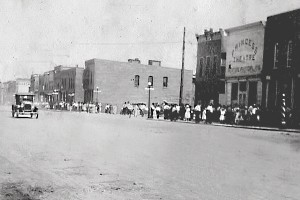 Remember the last time you went to the movies? There might have been a line as you went in, but with the ability to get movies right at home on the television, the lines were probably not like they used to be. I remember going to the movies when we stood in line, outside…for over an hour to get inside. In the wintertime, that was brutal, but you did it, because you really wanted to see the movie. Of course, when I was a kid, and we went to the movies, the theater was packed with kids, planning to see the latest Disney film, and the minute the lights went out, the crowd could no longer contain their excitement, so they broke out in loud screaming. It was simply the excitement that could no longer be contained inside, coming out in the form of a scream.
Remember the last time you went to the movies? There might have been a line as you went in, but with the ability to get movies right at home on the television, the lines were probably not like they used to be. I remember going to the movies when we stood in line, outside…for over an hour to get inside. In the wintertime, that was brutal, but you did it, because you really wanted to see the movie. Of course, when I was a kid, and we went to the movies, the theater was packed with kids, planning to see the latest Disney film, and the minute the lights went out, the crowd could no longer contain their excitement, so they broke out in loud screaming. It was simply the excitement that could no longer be contained inside, coming out in the form of a scream.
Now, take a trip back in time with me to a time when movies were very new. The novelty had not worn off, as it has today. Not everyone had seen a moving picture show. Even as kids, filled with excitement at the latest movie, we would never have been able to understand the level of excitement that came from seeing those first moving picture shows. I suppose there were people that felt like this new form of entertainment was not a good thing, but most felt like it was something exciting that they wanted to be a part of. I seriously doubt that they could have had any idea what an enormous impact those first moving picture shows would have on mankind.
Today, we have much more than moving picture shows, and television…which exist in almost every home in America, brings us much more than entertainment. We can turn on our TV and we are instantly connected to weather warnings, breaking news, politics, and yes, even entertainment. We can tune into learning channels that teach us about everything from animals to languages to space, and we can even watch programs from our favorite religious leaders and in my case, even our church, which broadcasts its Sunday morning service all over Wyoming, for people who can’t get to church, or don’t have a church in their small town.
So much has changed in our world since that first moving picture show, and while, we still go to the movies, the lines are rarely that long. That is quite possibly because the show is often shown at several theaters, with several showings a day, including afternoon showings. Many people don’t even go to the movies at all, choosing instead to wait for the movie to come out on television or DVD. And these days, we have the even further choice of watching television or movies on our PC, laptop, tablet, or even our cell phone. Whatever way we choose to enjoy this type of entertainment, it all started with the moving picture show.

